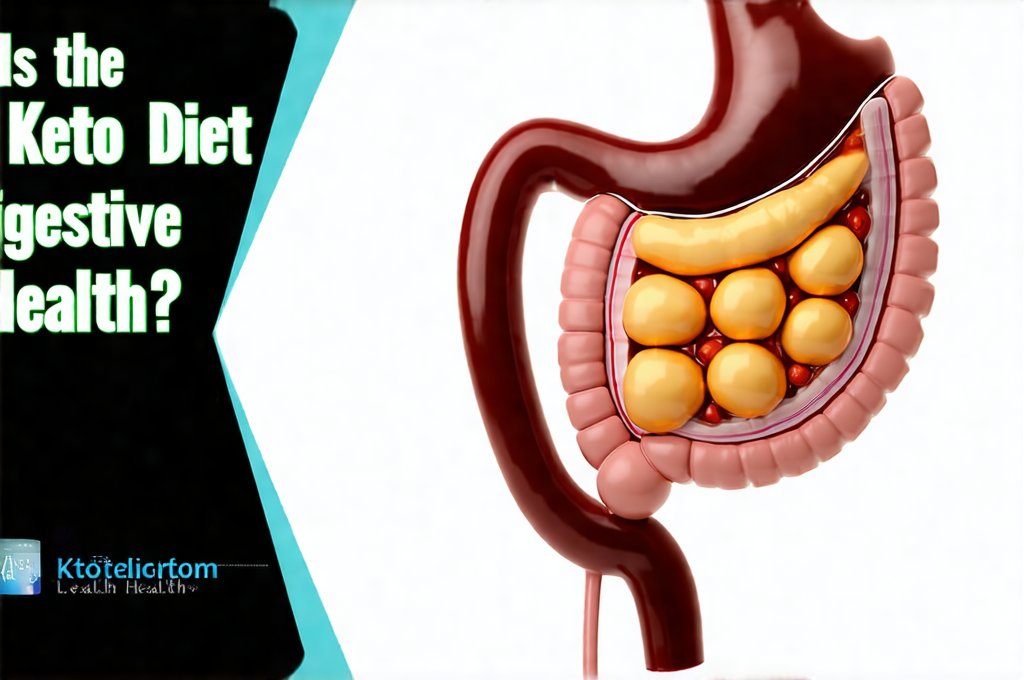The ketogenic diet, often shortened to “keto,” has exploded in popularity over the last decade as a weight-loss strategy and lifestyle choice. Central to its premise is a drastic reduction in carbohydrate intake, forcing the body into a metabolic state called ketosis where it begins to burn fat for fuel instead of glucose. While many tout its benefits – from rapid weight loss to improved mental clarity – growing concerns exist about its potential impact on digestive health. The very restrictive nature of the keto diet can significantly alter gut microbiome composition and function, leading to a range of gastrointestinal issues that warrant careful consideration.
Understanding whether the keto diet is “bad” for digestive health isn’t straightforward; it’s less about blanket condemnation and more about individual responses and how diligently the diet is managed. A poorly planned or executed ketogenic diet can indeed create imbalances within the digestive system, but a well-formulated approach with an emphasis on nutrient density and fiber sources may be tolerated by some individuals without significant issues. This article delves into the complexities of keto’s effect on digestion, exploring potential problems, strategies for mitigation, and who might want to avoid this dietary pattern altogether.
Keto and the Gut Microbiome
The gut microbiome – that vast ecosystem of trillions of bacteria residing in our digestive tract – plays a critical role in overall health, influencing everything from immunity and mental wellbeing to nutrient absorption and digestion itself. The keto diet’s severe carbohydrate restriction directly impacts these microbial communities. Carbohydrates are a primary food source for many beneficial bacteria in the gut; when drastically reduced, their populations can diminish, while those that thrive on protein and fat may increase. This shift isn’t necessarily harmful per se, but it can create an imbalance known as dysbiosis.
Dysbiosis is linked to a host of digestive issues, including bloating, gas, constipation, diarrhea, and increased intestinal permeability (often referred to as “leaky gut”). A less diverse microbiome also means reduced production of short-chain fatty acids (SCFAs) like butyrate, propionate, and acetate – crucial metabolites that nourish the cells lining the colon, reduce inflammation, and support overall gut health. The absence of fiber from many traditional carbohydrate sources can exacerbate this problem as SCFAs are largely produced through the fermentation of dietary fiber by gut bacteria. Understanding how childhood diet shapes the microbiome is also important when considering long term changes.
Furthermore, the increased fat intake characteristic of keto can alter bile acid metabolism, potentially leading to malabsorption issues and changes in gut motility. While some fats are essential for digestive function, excessive amounts – particularly saturated and processed fats – can disrupt the delicate balance within the gut ecosystem and contribute to inflammation. The long-term consequences of these microbial shifts are still being researched, but they underscore the importance of mindful keto implementation. Tools for identifying silent inflammation can help monitor gut health.
Common Digestive Complaints on Keto
Many individuals experience noticeable digestive discomfort when first adopting a ketogenic diet, often collectively referred to as “keto flu.” While not technically influenza, this period involves symptoms like fatigue, headache, nausea, and – crucially – digestive upset. Constipation is perhaps the most frequently reported issue, stemming from reduced fiber intake and changes in gut motility. The lack of carbohydrates also means less bulk in stool formation, further contributing to constipation. Diarrhea can occur too, often triggered by increased fat intake or the introduction of new foods aimed at replacing carbs.
Bloating and gas are common as well. The altered microbiome struggles to efficiently process the higher fat content and protein loads, leading to fermentation and gas production. Some individuals may also experience abdominal cramping and discomfort due to changes in gut motility and potential food sensitivities. It’s important to note that these symptoms aren’t universal; some people adapt remarkably well to keto with minimal digestive disruption. However, for others, the diet can significantly exacerbate pre-existing digestive conditions or create new ones. Individuals with Irritable Bowel Syndrome (IBS), Small Intestinal Bacterial Overgrowth (SIBO), or Inflammatory Bowel Disease (IBD) should be particularly cautious about adopting a ketogenic lifestyle and ideally seek guidance from a qualified healthcare professional. Digestive tests that work for people on the move can help identify sensitivities.
Mitigating Digestive Issues on Keto
Even if you experience initial digestive discomfort, several strategies can help minimize these effects and support gut health while following a keto diet.
-
Prioritize Fiber Intake: Though carbohydrates are restricted, it’s crucial to incorporate low-carb fiber sources into your diet. Good options include:
- Avocados
- Non-starchy vegetables (spinach, kale, broccoli, cauliflower)
- Chia seeds and flaxseeds (in moderation)
- Psyllium husk (use cautiously and with adequate hydration)
-
Hydrate Adequately: Water is essential for digestive function and preventing constipation. Aim for at least 8 glasses of water per day, and even more if you’re physically active. Electrolyte balance is also important on keto due to increased fluid loss; supplementing with sodium, potassium, and magnesium can help prevent dehydration-related digestive issues.
-
Focus on Gut-Friendly Fats: Not all fats are created equal. Prioritize healthy fat sources like avocados, olive oil, coconut oil, nuts, and seeds. Limit processed fats, trans fats, and excessive amounts of saturated fat as these can contribute to inflammation and disrupt gut function.
-
Consider Probiotic & Prebiotic Supplementation: Introducing a probiotic supplement can help repopulate beneficial bacteria in the gut, while prebiotics (found in foods like garlic, onions, and asparagus – though used sparingly on keto) provide nourishment for those bacteria. However, it’s essential to choose high-quality supplements and consult with your healthcare provider before starting any new supplementation regimen. Digestive rest days can also support gut health.
Who Should Avoid Keto?
While some individuals can successfully navigate a ketogenic diet without significant digestive issues, certain groups should exercise extreme caution or avoid it altogether. Those with pre-existing digestive conditions like IBS, SIBO, IBD (Crohn’s disease and ulcerative colitis), or gastroparesis are particularly vulnerable to negative effects. The restrictive nature of the diet can exacerbate symptoms and interfere with treatment plans.
Individuals with a history of eating disorders or disordered eating patterns should also avoid keto due to its potential to reinforce restrictive behaviors and create unhealthy relationships with food. Similarly, pregnant or breastfeeding women require adequate carbohydrate intake for optimal health and fetal development; keto is generally not recommended during these periods. Finally, people taking certain medications – particularly those affecting blood sugar levels or kidney function – should consult their doctor before starting a ketogenic diet as it may interfere with medication efficacy or worsen underlying conditions. It’s also important to understand how seasonal diets can impact digestion. Best practices for transitioning to a low fat diet are also important considerations. Building a one pot meal can simplify dietary changes.
In conclusion, the relationship between the keto diet and digestive health is complex and highly individual. While it can offer benefits for some, its restrictive nature poses potential risks to gut microbiome balance and digestive function. Careful planning, prioritizing fiber intake, staying hydrated, and choosing healthy fat sources are essential for mitigating these effects. Ultimately, understanding your own body’s response and seeking guidance from a healthcare professional is crucial for determining whether the keto diet is right for you.


















